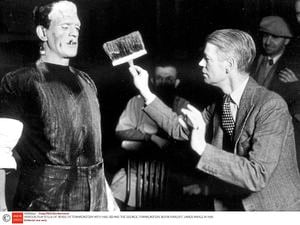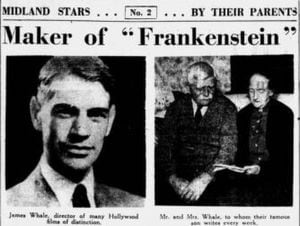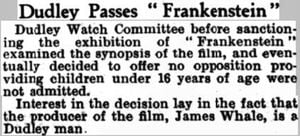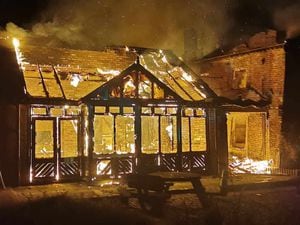From cobbler to 'mystery' surrounding Hollywood pool death: The life and times of Dudley's legendary film director
So how did the son of a Black Country foundry worker and nurse become one of Hollywood's most notable film directors?

Heard of James Whale? Well, he started out as a Black Country cobbler but ditched that to become the man responsible for the original movies of Frankenstein and Bride of Frankenstein in the 1930s.

Newspaper archives also reveal much about his colourful life, which started with humble beginnings as a cobbler in Dudley, to being captured and becoming a prisoner of war – and later sparking years of "mystery" surrounding his untimely death in a swimming pool at his Pacific Palisades home.
His life proved to be far from mundane, but neither was his death. For more than two decades, fans of the cinematic father wondered if he was the victim of foul play. It turns out he wasn't though – a suicide note was released decades later by his former partner, lover and lifelong friend David Lewis.
Keen historian and self-professed 'history influencer' Sarah Haywood, who works as a teaching assistant at Brierley Hill Primary School, has been researching Whale's colourful life and shared her finds from the British Newspaper Archives with Express & Star readers.
Born July 22, 1889, the sixth of seven children to blast furnaceman William Whale and his wife Sarah, a nurse. He attended Kates Hill Board School, Baylies School in Tower Street, and finally Blue Coat School before leaving to become a cobbler.
Mum-of-two Sarah said: "This week I've been researching another local legend of Dudley, James Whale. He was quite the character.
"Whale was unquestionably one of Hollywood’s all-time greatest film directors and he was actually the son of a foundry worker from the Black Country."
Speaking on his filmwork, he once said: "I do not doubt that when Dudley people see the film they will recognize some of these types". His loyalty with his Black Country roots remained strong – and he once even returned for a three-month holiday away from all the Hollywood excitement.
Interestingly, his mother never watched Frankenstein after her famous son warned her that the film would be "too frightening".
From Dudley Cobbler to Hollywood darling
As a young man in Dudley, Whale designed price tags and lettering for his neighbours and local shopkeepers. The money he earned helped pay fees for evening classes at Dudley School of Art, Priory Street - the beautiful building was last used as the old Dudley Museum.
Whale stepped up and volunteered in the armed forces in 1916, climbing the ranks to the second lieutenant in the Worcestershire Regiment.
James's life took a remarkable turn when, unfortunately, in 1917 he was captured while leading a raid and held in a POW camp in Holzminden, Lower Saxony, Germany.

Sarah added: "During the 15 months in the POW camp, James discovered his passion for theatre and began directing and acting in plays with fellow prisoners. The plays were a weekly event, enjoyed by the other prisoners. James would also design costumes with what materials were readily available and cast his creativity by painting stage scenes.
"This experience ignited his creative spark and set him on a path toward becoming a director. James also passed the time away by drawing cartoons of his companions. The cartoons appeared in magazines and newspapers, including a detailed drawing of the dress rehearsals during his time as a prisoner of war. This was published in World Worldwide magazine and the Bystander."
After the war ended he joined Birmingham Repertory Company, and his first stage debut was in Abraham Lincoln.





